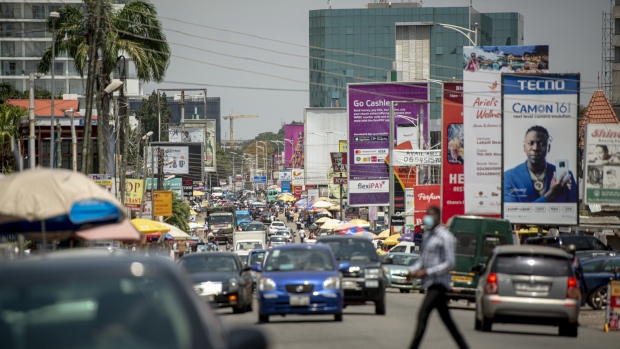Sep 27, 2022
Ghana Opposition Holds Key to Expedited IMF Funding Deal
, Bloomberg News

(Bloomberg) -- Ghana’s plan to access as much as $3 billion in funding from the International Monetary Fund and regain access to capital markets runs the risk of being delayed by political opposition.
An IMF mission is due to conclude an 11-day visit to Ghana on Oct. 7 to assess the state of the West African nation’s public finances. Should the Washington-based lender deem that its 393.4 billion cedis ($38 billion) of debt is unsustainable, the authorities will have to take remedial action, including restructuring its liabilities, to qualify for assistance, the IMF said last week.
The government is already considering that eventuality. While it is investigating the option of restructuring part of its $19 billion of local debt, external liabilities may be included, according to three people familiar with the situation, who asked not to be identified because they are not authorized to speak publicly.
“We are currently engaging all stakeholders, including parliament, to attain consensus on the IMF negotiations,” John Kumah, a deputy minister of finance, said in response to questions before the IMF mission began. “Government has not finalized any decision on debt restructuring yet.”
Ghana was shut out of international capital markets this year as investors lost confidence in its ability to service its debts. The government began engaging with the IMF in July after its move to cut discretionary expenditure by as much as 30% and other measures failed to stem a selloff in the country’s international bonds.
The most recent IMF debt sustainability analysis, conducted in 2021, found Ghana at a high risk of debt distress and vulnerable to rising debt servicing costs. Interest costs have climbed since then, Fitch Ratings noted last week when it downgraded Ghana’s debt to CC, four levels below investment grade.
Any reorganization of the nation’s liabilities would require approval from parliament, where President Nana Akufo-Addo’s New Patriotic Party and the main National Democratic Congress opposition have held an equal number of seats since 2021. The split has left the government reliant on the backing of a single independent lawmaker to break the tie and push through legislative changes.
The opposition showed its clout last year when it delayed the implementation of a new levy on financial transactions, forcing Finance Minister Ken Ofori-Atta to reduce the tax.
‘Ghanaian Dances’
“Building consensus at the top of the political pyramid takes time because you have to do all the usual Ghanaian dances,” Bright Simons, an analyst at the Accra-based policy think-tank IMANI, said by phone. “You have go to traditional leaders, to religious leaders, to the head of the opposition.”
Roughly three-quarters of the government’s total interest bill was incurred on domestic debt last year, according to a REDD Intelligence note. While Ghanaian banks that hold about 32% of outstanding domestic bonds may be amenable to a restructuring because of the amount of business they do with the state, getting the opposition to agree to a targeted reorganization will be a harder sell.
“We are cautioning the government to be mindful of the ramifications of the restructuring on the local economy,” Cassiel Ato Forson, an NDC lawmaker and member of parliament’s finance committee, said by phone. “Most importantly, the burden of restructuring should not only be placed on local investors, but must be shared fairly between both the local and foreign debt holders.”
The opposition’s ultimate stance toward debt restructuring may be determined with an eye on 2024 elections that will bring an end to Akufo-Addo’s second and final term.
“Restructuring both domestic and external debt ensures that the government cannot recover until the next elections,” Simons said. That would require it to further curb spending “for the next two years and if they did that, they would not be able to win the next election under any circumstance,” he said.
©2022 Bloomberg L.P.





